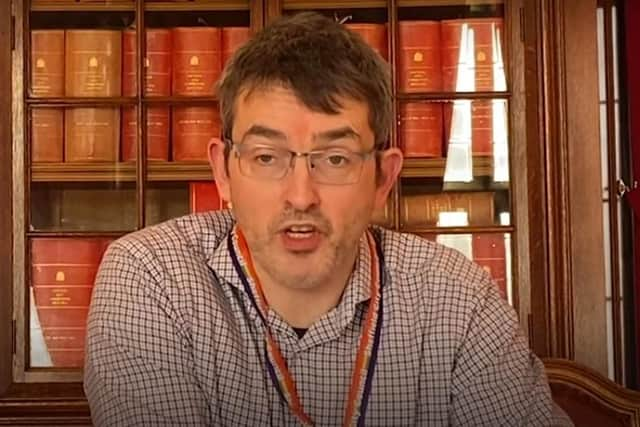Sheffield ‘beginning to see impact of vaccinations’ as health chief sends message of hope
and live on Freeview channel 276
Mr Fell warned that the infection rate is much higher than it was around the time of previous lockdown easing, and said that new variants of the illness could mean the baseline infection rate remains higher long term.
He said: “As of today the rate is about 220 per 100,000. That is, clearly, much lower than it was, it’s much lower in Sheffield than it i for much of the rest of England, actually, but still too high. It is significantly higher than it was last summer.
Advertisement
Hide AdAdvertisement
Hide Ad"Hospitals are still very busy. [We have] probably seen the peak of hospitalisations as a result of Covid but still, in the order of about 15 to 20 per cent of beds have someone with Covid in them.


“Principally the transmission is in working age people who are out and about a lot more, both at work and in transport.
"The business end has always been household to household transmissions. That will be a feature for some time to come.”
Mr Fell warned that because the infection rate is around 200 and R only just below one, it could ‘take off again really quickly’. Last summer when restrictions eased, the infection rate was around 20.
Advertisement
Hide AdAdvertisement
Hide AdHowever, he said that as spring draws in and the vaccination programme advances, people could have ‘hope’.
“We’re beginning to see the impact of vaccination in hospitals and in care homes,” he said.
“Thus far, well more than 60,000 people have had their first vaccination in the month the programme has been operating.
"The baseline rate of infection will probably fall. I think it will settle and flatline, it’s difficult to know where. I think the baseline rate of infection will be much much higher than it has been.
Advertisement
Hide AdAdvertisement
Hide Ad“The B117 variant of the illness will put upward pressure of the baseline rates of infection but on the counter spring is coming and Coronaviruses tend to be seasonal.
“We’ll spend more time outside than inside and outside there is a lower risk from a transmission perspective so that will push the rate downwards.
“We’ll be a fairly well vaccinated population by spring and that will have an impact on the rate of hospitalisation and death.”
In spite of this, Mr Fell stressed the importance of maintaining lockdown restrictions for the forseeable future.
Advertisement
Hide AdAdvertisement
Hide AdHe said: “We all want hope but it’s important that we don’t give people false hope. What we mustn’t allow is the spread of Covid-19 in the unvaccinated population. This will cause a significant number of ill people, some of which will be poorly enough to go to hospital, some of which will sadly die.
“The second thing allowing unchecked spread will invite is further mutation. Imagine a scenario where there is a more severe strain where the vaccinations don’t work.
“For these reasons [...] I think there will still be restrictions for some time to come. It’s impossible for me to predict how long that may be. I think we will see a very careful easing of restrictions over the spring period. We’ll ease them bit by bit and see what impact that has.”